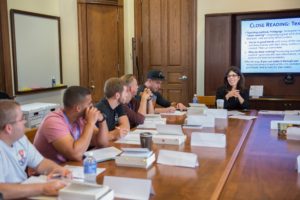Intensive program helps prepare enlisted veterans for transition from military to four-year college.
Syracuse, New York – For some military veterans, the first day of school at a new college or university is as challenging as a deployment to a foreign country. Immersion in a new culture and reintroduction to a demanding academic environment can make the transition from military to higher education difficult. To ease the transition, the Warrior-Scholar Project (WSP) is hosting an intensive one week academic boot camp at Syracuse University beginning Sunday, June 18.
The Warrior-Scholar Project coordinates immersive academic preparation courses for enlisted military veterans of any skill level at America’s top universities. The program is designed to help military veterans develop and rediscover the skills and confidence necessary to successfully complete four-year undergraduate degrees. Because veterans are non-traditional students with unique experiences distinguishing them from their college peers, WSP also uses the boot camps to help prepare participants for the emotional and cultural adaptations required to succeed in a higher education setting.
“We are proud to host a Warrior-Scholar Project Academic boot camp at Syracuse University for the 2017 year,” said Dr. Sidney Ellington, Executive Director of WSP. “The program at Syracuse will tap into the immense potential of Post-9/11 veterans and reduce obstacles to success, addressing veterans’ misperceptions about college and building their confidence through an intense academic reorientation.”
WSP launched its first program at Yale University in 2012 with nine participants. Since then, WSP has expanded to encompass 12 top schools, including Syracuse University, and is on track to host more than 200 veterans at boot camps across the country in 2017. In addition to Syracuse University, WSP graduates have gone on to enroll at top schools including Yale University, Harvard University and Georgetown University.
“Stepping onto a college campus is intimidating for anyone, and can be even more so for active or veteran service members,” said Mike Haynie, Vice Chancellor and Executive Director of the Institute for Veterans and Military Families – Syracuse University. “The important role the Warrior-Scholar Project plays in engaging these military members with universities around the U.S. is vital to their future career success. We are proud to be a part of that work, and we look forward to hosting this year’s participants this summer to share our educational experience with them.”
Each WSP boot camp is run by a team of student veterans, and taught by university professors and graduate students. An intensive syllabus composed of both classic and modern scholarly works guides participants as they learn how to frame their ideas in an academic context, think critically, and formulate scholarly arguments. Participants not only learn the subject-matter material; they learn how to learn.
“Because of their technical training and diverse, cross-cultural experiences, military veterans have much to contribute to higher education, beyond their strengths in discipline, teamwork, and resilience,” said Corri Zoli, Chair, Board of Academic Advisors – WSP and Director of Research, Institute for National Security and Counterterrorism – Syracuse University. “Yet too often veterans are an uncommon sight at four-year colleges. The presence on Syracuse University’s campus of venerable veterans’ programs such as the Defense Comptrollership Program and the Military Visual Journalism Program, means our partnership with WSP is a natural fit, and it works exceptionally well. As an instructor, I can attest to how this college-readiness program strives to make veterans part of a wider academic conversation and to become campus leaders.”
“This course was a rigorous challenge which prepared myself to succeed in my studies at Syracuse University,” said Adam LeGrand, WSP program alumni. “The focused reading and writing skills have enabled me to anticipate earning honors this past semester; I highly recommend this course to any veteran considering returning to higher education. The contacts and support I have received in my goals of attending law school from WSP staff and alumni have by far been the most important outcome for myself.”
WSP funders and private donors cover the entire cost of the program for participants, excluding travel. Student veterans attending Syracuse University boot camp will reside in campus housing and attend lectures in various classrooms.
To learn more about the program, visit www.warrior-scholar.org.
About the Warrior-Scholar Project
The Warrior-Scholar Project (WSP) runs immersive academic boot camps hosted at America’s top universities for enlisted military veterans, and is funded by the prestigious Bob Woodruff Foundation, the Diana Davis Spencer Foundation, and the National Endowment for the Humanities. The majority of enlisted personnel exiting the military have not been in a classroom setting for several years, and find it hard to transition, being unprepared for the fundamentally different social and cultural environment. WSP helps veterans rediscover and develop the skills and confidence necessary to successfully complete 4-year undergraduate programs in higher education. WSP unlocks their educational potential and transforms the way veterans view themselves as students. For more information, visit http://www.warrior-scholar.org, email info@warrior-scholar.org or call 202-796-8777.
About Syracuse University
Syracuse University is a private research university of extraordinary academics, distinctive offerings, and an undeniable spirit. With a gorgeous campus in the heart of New York State, a global footprint, and nearly 150 years of history, our university is made for those who want a quintessential college experience. Proudly selective, we take a chance on people who dream big. This is where you come to cheer, to grow, to become the person you want to be. The scope of our university is a testament to its strengths: a pioneering history dating to 1870; a choice of more than 200 majors and 100 minors; nearly 15,000 undergraduates and 5,000 graduate students; more than a quarter million alumni in 160 countries; and a student population from all 50 U.S. states and 123 countries.

